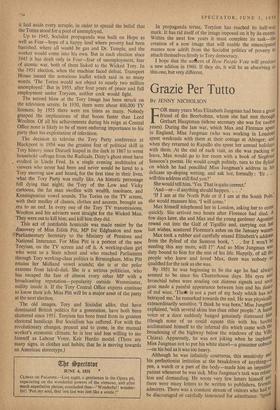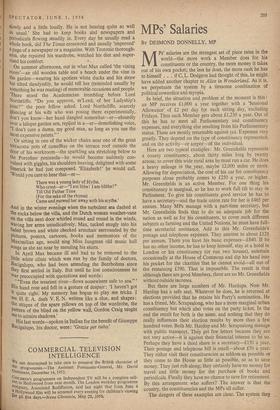Grazie Per Tutto
BY JENNY NICHOLSON FOR many years Miss Elizabeth Jungman had been a great friend of the Beerbohms, whom she had met through Gerhart Hauptman (whose secretary she was for twelve years). During the last war, which Max and Florence spar in England, Miss Jungman (who was working in London) spent weekends with them at their cottage at Abinger; and when they returned to Rapallo she spent her annual holidays with them. At the end of each visit, as she was packing to leave, Max would go to her room with a book of Siegfried Sassoon's poems. He would cough politely, turn to the flyleaf on which he had pencilled Miss Jungman's address in his delicate up-sloping writing, and ask her, formally: 'Er . • • will this address still find you?'
She would tell him, 'Yes. That is quite correct.'
`And—er—if anything should happen. . . .' , `If I am at the North Pole or if 1 am at the South Pole, she would reassure him, 'I will come.'
Max himself telephoned her in London, asking her to core quickly. She arrived two hours after Florence had died. A few days later, she and Max and the young gardener Agostino rowed out into the Gulf of Tigullio and, carrying out her last wishes, scattered Florence's ashes on the January waters. Max took a rubber and carefully erased Elizabeth's address from the flyleaf of the Sassoon book, `. . . for I won't be needing this any more, will I?' And so Miss Jungman Was duty bound to him for the rest of his life. Happily, of all till: people who knew and loved Max, there was nobody st' qualified for the task as she was.
By 1951 he was beginning to be the age he had alwaYs seemed to be since his Charterhouse days. His eyes a' bronchial tubes were sending out distress signals and soon gout made a painful appearance between him and his fiaso) of red wine. 'Theft is not a part of my body which has n°1 betrayed me,' he remarked towards the end. He was physical') extraordinarily sensitive. 'I think he was born,' Miss JungnitT explained, 'with several skins less than other people.' A harsh voice or a door suddenly banged genuinely distressed hill' (though none of us could equate this with his havi0 acclimatised himself to the infernal din which came with the broadening of the highway below the windows of the Vill` Chiara). Apparently, he was not joking when he implore', Miss Jungman not to put his white shawl—a gossamer cobwer/ —on his bed as it was too heavy. Although he was infinitely courteous, this sensitivity and his perfectionist irritation at the breakdown of anything–I pen, a watch or a part of the body—made him an invader; patient whenever he was sick. Miss Jungman's task was relent' less and demanding. He wrote very few letters himself ao` there were many letters to be written to publishers, friends' admirers. There was a constant stream of visitors who had tie be discouraged or carefully instructed for admittance. `SPe3" slowly and a little loudly. He is not hearing quite so well as usual.' She had to keep books and newspapers and periodicals flowing steadily in. Every day he usually read a whole book, did The Times crossword and usually 'improved' a page of a newspaper or a magazine. With Teutonic thorough- ness, she repaired his wardrobe, watched his diet and super- vised his comfort.
On summer afternoons, out in what Max called 'the vining room'—an old wooden table and a bench under the vine in the garden—wearing his spotless white ducks and his straw hat tilted dandyishly, he would tell her (reminded usually by something he was reading) of memorable occasions and people. `There stood the Academician trembling before Lord Northcliffe. "Do you approve, m'Lord, of her Ladyship's Pose?" the poor fellow asked. Lord Northcliffe, scarcely glancing at his wife who was posing there experimentally, don't you know—her hand dangled somewhat—er—absurdly over a lalique garden urn, replied in a--er—demolishing voice, "I don't care a damn, my good man, so long as you use the most expensive paints." ' Or sitting in one of the wicker chairs near one of the great terracotta pots of camellias on the terrace roof outside the door of his workroom—the sparkling sea stretching below to the Portofino peninsula—he would become suddenly con- vulsed with giggles, his shoulders heaving, delighted with some limerick he had just composed. 'Elizabeth!' he would call. `Would you care to hear that—er- There was a young lady of Hythe, Who cried—er—"I am lithe ! I am blithe!"
Till Old Father Time (For the sake of the rhyme) Came and mowed her away with his scythe.'
And in the winter evenings when the turbulent sea dashed at the rocks below the villa, and the Dutch woman weather-vane 011 the villa next door whirled round and round in the winds, Waving her arms unindicatively, Max, tucked snugly into his faded brown and white checked armchair surrounded by the Pictures, posters, cartoons, books and mementoes of the Maximilian age, would sing Miss Jungman old music hall Songs as she sat near by mending his shirts.
In April Max became ill and had to be removed to the little white clinic which was run by the family of doctors, Bacigalupo, who had been attending the Beerbohms since they first settled in Italy. But until he lost consciousness he Was preoccupied with quotations and words : .„.` "Even the weariest river—flows somewhere safe to sea."' His hand rose and fell in a gesture of despair: 'I haven't got it quite right. My memory has begun to play me tricks. I see H. E. A. dash V. E. N. written like a clue, and shapes : the shapes of the spare pillows on top of the wardrobe, the pattern of the blind on the yellow wall, Gordon Craig taught me to admire shadows.'
His last words—spoken in Italian for the benefit of Giuseppe Bacigalupo, his doctor, were: `Grazie per tutto.'



































 Previous page
Previous page